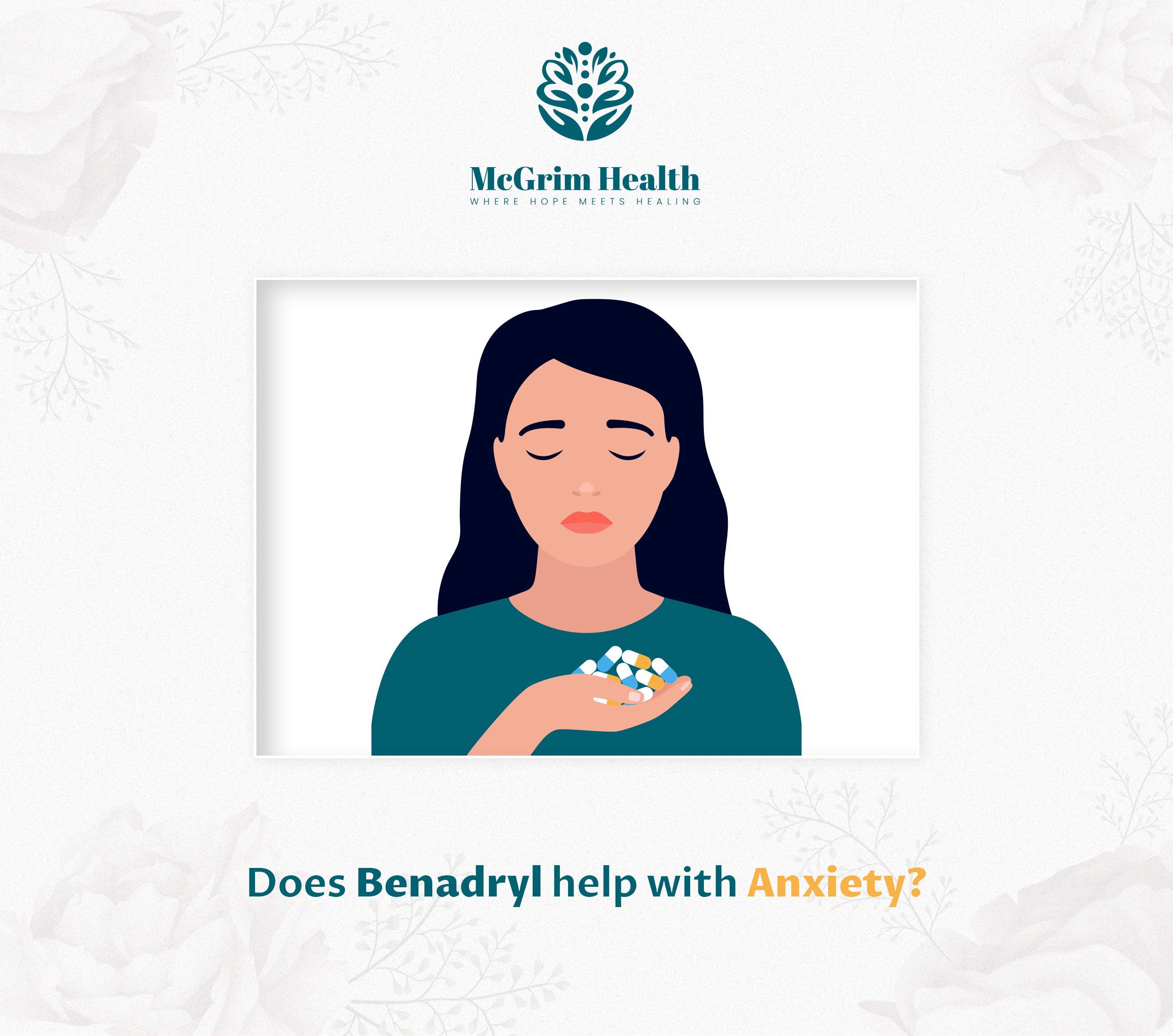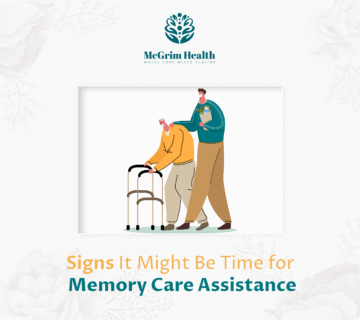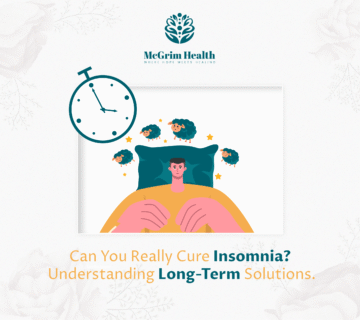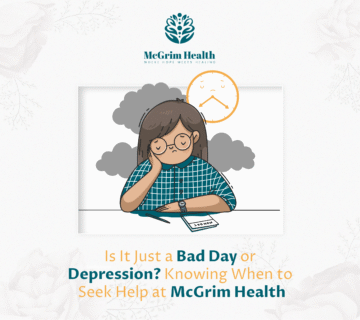Anxiety can turn daily life into a storm of worries. When panic blows in, finding quick relief is a natural instinct. Countless people rely on over-the-counter medications such as Benadryl to find relief. But the question looms: does Benadryl help with anxiety? Is it safe? We’ll clear the fog, debunk myths, and uncover healthier harbors for managing anxiety. Let’s dive into this together!
At McGrim Health, we know how heavy anxiety can feel. We’re here to help you find safe and lasting solutions. Your peace of mind matters, Contact us today.
What Is Benadryl?
Benadryl (generic name: diphenhydramine) is a first-generation antihistamine. It blocks histamine. This is a chemical your body releases during allergies. Common uses include:
- Easing allergy symptoms.
- Reducing rashes or hives.
- Helping with short-term sleep issues.
But using Benadryl for anxiety is not what this medication is made for. So why do people try it? Let’s dig deeper.
Why Does Benadryl Help with Anxiety? The Temporary Trap
Benadryl isn’t a solution for anxiety disorders. Its side effects might give a short feeling of calm. Let’s jump into the details:
- Drowsiness: Benadryl can make you very sleepy, quieting those racing thoughts—at least for a while.
- Sedation: The drug relaxes your body, which could mask anxiety symptoms for a few hours.
This “calm” is brief and risky. It’s like hitting “snooze” on anxiety. It doesn’t fix the issue.
Is Benadryl Used for Anxiety? Doctors Weigh In
Medical professionals do not recommend Benadryl for anxiety. Here’s why:
- No FDA Approval: Benadryl isn’t cleared for mental health concerns.
- Covering Up: It cloaks anxiety but ignores the deeper issues.
- Side Effects: Drowsiness, dizziness, and confusion can make daily tasks unsafe.
Key Risks of Using Benadryl for Anxiety:
- Tolerance: Your body may need higher doses over time to feel the same effect.
- Next-Day Fog: Even after sleeping, you might feel sluggish or unfocused.
- Emotional Numbness: Depending on sedation, it can dull your connection to healthy coping skills.
Can Benadryl Cause Panic Attacks? The Surprising Truth
For some, Benadryl brings a wave of calm; for others, not so much. Can it trigger panic attacks? Absolutely, it can—here’s the scoop:
- Physical Reactions: A racing heartbeat or dry mouth might surprise you. Blurred vision can sneak in, mimicking panic’s striking symptoms. Your brain could misread these signs as sheer terror.
- Mental Fog: The haze induced by the drug can leave you feeling adrift. This sense of losing control often sparks panic.
So, if you’re prone to panic attacks, Benadryl might dim the lights on your calm.
Does Benadryl Help with Panic Attacks?
Panic attacks are quick, fierce bursts of terror. Does Benadryl help with them? Sadly, it does not. Here’s why:
- No Fast Relief: Benadryl takes 15–30 minutes to work, which is too slow during a panic attack.
- Unpredictable Reactions: Instead of calming you, side effects like dizziness can make panic worse.
Better Ways to Manage Panic Attacks:
- Anchor yourself by naming five things that catch your eye.
- Embrace prescribed medications, like anti-anxiety meds, with your doctor’s green light.
- Center your calm through slow, deep breaths to reset your nerves.
Xanax and Benadryl: Are They Safe Together? A Dangerous Mix
Some people combine medications to boost calming effects. But are Xanax and Benadryl safe together? The short answer: No. Here’s why mixing them is risky:
- Double Sedation: Using both drugs can slow brain activity. This may result in very deep sleep or breathing problems.
- Memory Issues: High doses might cause “blackouts” or confusion.
- Overdose Alert: Combining depressants can create a dangerous mix.
Always check with your doctor before blending any medications.
Why Do People Try Benadryl for Anxiety? Breaking Down the Myths
Despite the risks, some still experiment with using Benadryl for anxiety. Common reasons include:
- Easy Access: It’s available without a prescription.
- Immediate Effect: The drowsiness feels like instant relief.
- Fear of Stigma: Some avoid seeing a therapist due to shame.
But remember: Quick fixes often lead to long-term problems.
Natural Alternatives to Benadryl for Anxiety Relief
Why risk it with Benadryl? Discover these safer, scientifically-backed methods instead:
-
Mindfulness and Breathing Exercises
- 4-7-8 Breathing: Inhale deeply for 4 seconds. Pause for 7 seconds. Exhale slowly for 8 seconds. Repeat this calming practice 3 to 4 times.
-
Lifestyle Changes
- Exercise: Step into joy with walking, yoga, or dancing; each move sparks endorphins.
- Sleep Hygiene: Chase dreams with 7–9 hours of restorative sleep to tame anxiety.
- Balanced Diet: Scale back on caffeine and sugar, the sneaky troublemakers of anxiety.
-
Over-the-Counter Supplements
- Chamomile Tea: Unwind with this gentle brew; apigenin helps you relax naturally.
- Magnesium: A vital ally against stress hormones; always consult your doctor first.
-
Therapy Options
- Cognitive Behavioral Therapy (CBT): Change your thinking. Negativity won’t win.
- Support Groups: Share your story; connection melts away feelings of isolation.
Prescription Medications That Actually Help with Anxiety
When natural methods fall short, consider these FDA-approved alternatives from your doctor:
- SSRIs, such as sertraline and fluoxetine, boost serotonin levels. This helps improve mood.
- Benzodiazepines like Xanax and Ativan provide quick relief for panic. Use them with caution!
- Beta-blockers, including propranolol, calm the storm within by easing rapid heartbeats.
Unlike Benadryl, these are customized to treat anxiety safely.
Final Thoughts: Does Benadryl Help with Anxiety?
While using Benadryl for anxiety might seem helpful, it’s a risky shortcut. The drowsiness fades quickly, and long-term use can harm your physical and mental health. Instead, focus on proven strategies:
- Talk to a Doctor: They can recommend safe treatments tailored to you.
- Build a Toolkit: Combine therapy, exercise, and relaxation practices.
- Be Patient: Anxiety management takes time, but lasting solutions are worth it.
Your mental health is important. Don’t just use quick fixes—find support that really helps.
FAQs
Why does Benadryl help with anxiety in some people?
Drowsiness feels like a quick escape from anxious thoughts. But wait! It’s not real relief; it just covers up the true problem.
Can Benadryl help with social anxiety?
Not at all. Social anxiety requires exposure therapy and counseling, not a sleepy escape.





No comment